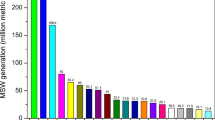Abstract
In the history of waste management in Korea, systematic and integrated management started in the middle of the 1980s with the establishment of the Waste Management Law. By enforcing several specialized, discrete acts under this basic law and imposing extended producer responsibility as well as a volume-based garbage rate system based on the concept of polluter payment, waste management has become more effective for both general household waste and industrial hazardous/massive waste. The management mainly involves not only a reduction in waste generation, but also appropriate treatment and maximum recycling of the waste. Recent policy trends have focused on converting wastes into resources, and these have led to the implementation of “waste to energy and resources” and a “sustainable and circulation society” in the present and future plans for waste management. A new law called “Promotion Law for Achieving a Resource Circulation Society” meant to replace the basic law and to create a platform of resource circulation, is currently under review. This law integrates all the existing laws and acts to utilize waste more efficiently as a resource, and it has the potential to significantly reduce the amount of wastes landfilled. Details of the history and background of previous waste management efforts, recent movements and current status, and future pathways for achieving a resource circulation society are introduced. This could promote the establishment of a zero waste society and also extend the life of waste landfill facilities in Korea.







Similar content being viewed by others
References
Agamuthu P, Masaru T (2014) Municipal solid waste management in Asia and the Pacific Islands. In: Min DK, Rhee SW (2014) Municipal solid waste management in Korea. Springer, Singapore, pp 173–194
Daegu Gyeongbuk Development Institute (2010) Environment. past and present. In: Kim GH Waste management, Daegu, pp 73–109
Jung JC (1998) Waste disposal. DongHwa Technology, Paju
Jung YH (2009) Report of waste management and recycling. Dissertation, University of Ulsan
Environmental statistics yearbook (1988–2012) Ministry of environment. http://www.me.go.kr/home/web/index.do?menuId=123. Accessed 21 July 2014
Environmental white paper (1982–2012) Ministry of Environment. http://www.me.go.kr/home/web/index.do?menuId=124. Accessed 21 July 2014
Waste statistics yearbook (1983–2012) Generation and disposal status of waste in 1982 to 2011. Ministry of environment. http://www.me.go.kr/home/web/index.do?menuId=128. Accessed 27 April 2014
End-of-life vehicles statistics (2012) ELVs statistics in 2011. http://www.kasa.or.kr/. Accessed 21 July 2014
Korea Legislation Research Institute (2012) Legislation basic research for introduction of the recycling target management system of WEEE. Korea Legislation Research Institute, Seoul, pp 24–25
Ministry of Environment (2005) A study on assessment of volume-based garbage rate for decade and actualization plan of garbage bag cost. Ministry of Environment, Seoul
Park JW (2009) 3R policies of Korea. Ministry of Environment, Seoul
Son CJ (2012) A study on the extended producer responsibility system as a waste management policy. Dissertation, University of Seokyeong
Park GS (2008) The effective policy of extended producer responsibility. The monthly packaging world 177:70–78
Ministry of Environment (2013) Policy report of promotion measure for RCS (Resource Circulation Society). Ministry of Environment, Seoul
Coordination of Relevant Ministry (2011) Primary basic plan of resource circulation. Ministry of Environment, Seoul
Acknowledgments
This study is financially supported by the New & Renewable Energy Technology Development Program of the Korea Institute of Energy Technology Evaluation and Planning (KETEP) grant funded by the Korea government Ministry of Knowledge Economy (2011T100200273) and the R&D Center for Valuable Recycling (Global-Top Environmental Technology Development Program) funded by the Ministry of Environment (Project No.:11-A03-MB). It is also supported by the Korean Ministry of Environment (MOE) as a knowledge-based environmental service (Waste to energy & recycling) Human Resource Development Project.
Author information
Authors and Affiliations
Corresponding author
Rights and permissions
About this article
Cite this article
Yang, WS., Park, JK., Park, SW. et al. Past, present and future of waste management in Korea. J Mater Cycles Waste Manag 17, 207–217 (2015). https://doi.org/10.1007/s10163-014-0301-7
Received:
Accepted:
Published:
Issue Date:
DOI: https://doi.org/10.1007/s10163-014-0301-7




